 |
Feeling lucky?
Want to
search
any of my partnershops yourself
for more, better results?
(commissions earned) |
The links below
will take you
just there!!!
|
|
 |
Today mostly remembered for his roles as James Bond-villain
Blofeld in You Only Live Twice (1967, Lewis Gilbert) and as Doctor
Sam Loomis in the Halloween-series,
Donald Pleasence was actually nothing short of a great actor, and on stage
he played in many an acknowledged classic with many of the greatest actors
of his time, in particular Laurence Olivier, who was his acting idol. Yet on film
and television he was most often reduced doing character roles in formulaic
genre movies that did no justice to his talent (with of course a few
notable exceptions). Still, his filmography spans more than 200 credits on
both the big and the small screen, and Pleansence would always turn in an
impressive performance in one way or another (even though he would on
occasion just ham it up), and at times he would even save a movie by
his sheer presence.
Early Life, Early Career
Donald Pleasence was born the younger of two brothers in 1919 in
Worksop, Nottinghamshire, England, but his family later moved to the industrial town of Scunthorpe,
North Lincolnshire, England, where he was mainly brought up. His head
set on becoming an actor at a relatively early age, he quit school one
year prior to his graduation and applied for the Royal Academy of Dramatic
Art. He was even accepted but had to give up on it when he failed to
get a scholoarship to cover tuition and living expenses. Pleasence,
the son of a railroad stationmaster, then became a railroad station
manager for the next few years. However, he hadn't given up on acting yet,
and eventually he somehow got the job os assistant stage manager at the
Playhouse on Jersey, one of the Channel Islands. From here on it was
only a small step to an actual acting job, and eventually, he debuted at
the Playhouse in 1939, in a stage version of Emily Bronte's Wuthering
Heights, which won him some acclaim. Pleasence continued stage acting
over the next few years, and finally he made it to London in 1942, playing
Shakespeare. It seemed as if Donald Pleasence was a made man - when
desaster struck in the form of World War II, which at that time started to
hit England really hard. At first, pacifist Pleasence refused
to serve in the army and as a conscientious objector was sent to work in
lumbering to help the British war efforts. Six months in lumbering changed
Donald Pleasence's mind, and he enlisted in the RAF (Royal Air Force) to
serve his country. Bad luck however struck again in 1944, when his plane
was shot down over France and he was taken to a German prisoner-of-war
camp, Stalag 1 in Pomerania, where he spent the rest of the war, subjected
to mental and physical torture by his German captors. It is said that
during that time he wrote and produced several stageplays to entertain his
fellow prisoners. Eventually, Pleasence was freed by the Russians in
1945, and after the war he was quickly discharged from the army with the rank of flight lieutenant. Pleasence
pretty much immediately returned to the stage, as he thought this the best
way to recover from his traumatic experiences during wartime. Given
Pleasence's natural acting talent, it was not difficult for him to find
roles over the next few years, and his star was soon on the rise again.
Soon enough, he played in the prestigious Bristol Old
Vic Company, plus he journeyed to New York alongside Laurence
Olivier (his idol) and Vivien Leigh for a couple of plays in 1951. Over
the years, Pleasence' career gained enough momentum that he even started
to produce his own plays and quite successfully so, but about the
mid-1950's, he turned to television and motion pictures, allegedly because
he couldn't get any more good roles ...
TV- and Movie-Actor in Great Britain: The 1950's
Donald Pleasence' first TV-appearance dates back to 1952, in Arrow
to the Heart (Rudolph Cartier), an episode of BBC's
Sunday Night Theatre based on a play by German pastor/writer
Albrecht Goes - the show is above all else remarkable though because it
was the first work of writer Nigel Kneale (of later Quatermass-fame)
for the BBC.
Since back in the early 1950's, TV-dramas were still broadcast live, stage
actors like Pleasence, who could memorize their lines and were experienced
in performing live, were in high demand ...
In 1954, Donald Pleasence made his big screen debut, The
Beachcomber (Muriel Box), a film based on a story by W.Somerset
Maugham starring Glynnis Johns and Robert Newton. Pleasence however did
fail to leave a lasting impression in this film since his role was on one
hand too small, on the other hand he played a (darkened up) native (!) ...
Plesence had another small role in the movie Orders are Orders
(1954, David Panltenghi), but during the mid-1950's his future was more
with television than with feature films, as he appeared in several more BBC-productiosn,
including some more episodes of Sunday Night Theatre, and he
got the recurring role of Prince John on the ITV-series
The
Adventures of Robin Hood (1956 - 1958), whom he played as a
mentally unstable wannabe monarch. His most memorable
role during this time though might have been his appearance in the Sunday
Night Theatre-episode 1984 (1954, Rudolph Cartier), based on the
famous science fiction novel by George Orwell, scripted by Nigel Kneale
and starring a (relatively) young Peter Cushing (in fact he was already
41, but his career was just taking off then). The show was a tremendous
success and succeeded in making a household name of Peter Cushing, yet
strangely enough, when Michael Anderson adapted the novel for the big
screen two years later and no doubt tried to cash in on the TV-show's
success, he asked Donald Pleasence back but not Peter Cushing (his role
was taken over by Edmond O'Brien), but he gave Pleasence another, less
fitting role ...
In the latter half of the 1950's, Pleasence' big screen career finally
did take off, but the films he was in were hardly special and he was quite
often just hired to add a little colour to the otherwise monotonous
proceedings in a supporting role. Still, his many film and TV-appearances
during the era soon earned him the nickname The Man with the Hypnotic
Eye, thanks to his gazing stare and his always charged expression.
Pleasence' films from the second half of the 1950's
were the romantic comedy Value for Money (1955, Ken Annakin), the
war drama The Black Tent (1956, Brian Desmond Hurst), the
Ealing-production
The Man in the Sky/Test Pilot (1957, Charles Crichton), Manuela
(1957, Guy Hamilton) starring Trevor Howard, Elsa Martinelli and Pedro
Armendáriz, the Ealing-comedy
Barnacle Bill (1957, Charles Frend) starring Alec Guiness, Look
Back in Anger (1958, Tony Richardson) starring Richard Burton and
Claire Bloom, the Charles Dickens-adaptation A Tale of Two Cities (1958,
Ralph Thomas) starring Dirk Bogarde, the India-set World War II romance The
Wind Cannot Read (1958, Ralph Thomas), again starring Dirk Bogarde
plus Japanese Yoko Tani, the crime thriller The Man Inside (1958,
John Gilling) starring Jack Palance and Anita Ekberg, the film noir The
Shakedown (1959, John Lemont) starring Terence Morgan and Hazel
Court, the World War II espionage drama The Two-Headed Spy (1958,
André de Toth), Richard Thorpe's Killers of Kilimanjaro (1959)
starring Robert Taylor, and the Peter Sellers-comedy The Battle of the
Sexes (1959, Charles Circhton) which also stars Robert Morley,
Constance Cummings and Ernest Thesiger.
Rise to International Stardom: The
Early 1960's
The 1960's proved to be an especially successful decade for Donald
Pleasence, who was still waiting for his ultimate breakthrough: In Great Britain
he quickly became a household name in 1960
when he hosted the series Armchair Mystery Theatre, a spin-off of
the popular ITV-series
Armchair Theatre (in which he had made infrequent guest appearances from
1957 onwards). More importantly though for Pleasence'
international career was his move back to stage, where he took a role in
Harold Pinter's play The Caretaker alongside Robert Shaw and Alan
Bates at London's Arts Theatre Club ... and the play became an
instant success and ran for 14 consecutive weeks. In fact the play was so
successful that it then moved to New York's Broadway (including its
original cast) where it had a run of 165 performances. Eventually, the
play was also made into a film, The Caretaker/The Guest in
1963 by Clive Donner, featuring its original cast, but the film did not
match the success of the play - not that it mattered all that much to
Donald Pleasence because at that time his career was already going places
...
From 1960 onwards, Donald Pleasence would become a regular
in British horror films, a genre that, mainly thanks to the success of the Hammer-films,
was booming at the time:
- The Flesh and the Fiends (1960, John Gilling) was a shocker
based on the true life exploits of graverobbers Burke
and Hare in 19th century Great Britain, with Pleasence
playing Hare to George Rose's Burke and Peter Cushing's Doctor Knox,
the man the graverobbers used to deliver their corpses to.
- Circus of Horrors (1960, Sidney Hayers) is one of these
wonderful British shockers with wonderfully absurd plots: Here a
plastic surgeon (Anton Diffring) takes over a circus and operates
disfigured criminals and prostitutes to make them stars in his circus
- but when they want out, he has them die (circus-related) deaths ...
- The British/French co-production The Hands of Orlac (1960,
Edmond T.Gréville) stars Mel Ferrer as a pianist who after an
accident loses his hands and instead is transplanted those of a
murderer ... and suddenly it seems he has become a murderer himself -
or has he ? Christopher Lee is in this one as well. As in Circus of
Horrors, Pleasence' role is rather small and of minor importance
in this one though.
- What a Carve Up! (1961, Pat Jackson) is an ok but not really
memorable horror spoof starring Kenneth Connor, Sid James, Shirley
Eaton, Dennis Price and Michael Gough that above all else illustrates
how much of a horror mainstay Donald Pleasence has become by this
time.
- And then there was of course Doctor Crippen (1962, Robert
Lynn) which has Pleasence in a rare lead as the seemingly
mild-mannered doctor who has actually poisoned his wife (Coral Browne)
to then (unsuccessfully) escape to the USA with his secretary and
mistress (Samantha Eggar).
Sure, during the early 1960's, Donald Pleasence had also roles in non-horror
films, like the Hammer
crime thriller Hell is a City (1960, Val Guest) or the D.H.Lawrence
adaptation Sons and Lovers (1960, Jack Cardiff) starring Trevor
Howard and Dean Stockwell - but besides his theatrical success with The
Caretaker it must have been predominately his horror films that got
him his first parts in US-television shows - particularly anthology shows like One
Step Beyond (1961), Twilight
Zone (1962) and The
Outer Limits (1963), that were proof of US-television's newfound
fascintation with the fantastic.
Of special interest might also be another film during that time, John
Sturges' classic POW-movie The Great Escape (1963), in which he is
part of an ensemble cast headed by Steve McQueen and featuring James
Garner, Richard Attenborough, Charles Bronson and James Coburn who are all
playing prisoners of war in a German POW-camp, Stalag Luft 3, during World
War II - which is especially interesting since as mentioned above
Pleasence really was a German prisoner of war (in Stalag Luft 1 though).
According to some rumours, Pleasence was also given the function of
technical advisor on the film, since he was the only one in the cast and
crew who was actually a POW during that time, but according to other
rumours, his advice was constantly ignored - which above all else would
prove that too much realism isn't always good for a movie (even though the
film was based on a true story). As mentioned above, the film is about a
group of prisoners of war planning a daring break-out (hence the title).
Among them is Pleasence, who is actually blind as a mole, because of which
the others ultimately decide to leave him behind - which of course gives
his role much more depth than that of lead Steve McQueen ... By the way,
in 1988, the film received a made-for-TV sequel/remake, The Great
Escape II: The Untold Story (Jud Taylor, Paul Wendkos), this time
starring Christopher Reeve. Of the original cast, only Donald Pleasence
returns for the sequel, but this time he seems to have switched sides and
now plays a member of the SS.
As mentioned above, it is at
least rumoured that director John Sturges by and large ignored Donald
Pleasence technical advice on The Great Escape. This however did
not hurt Pleasence respect for Sturges, and the two would work together
again on The Hallelujah Trail (1965), a light-hearted Western comedy starring
Burt Lancaster and Lee Remick about a wagon train transporting barrels
over barrels of Whiskey being pursued by both the Temperance League
and a tribe of native Americans. Add to that some local miners and the
US-cavalry and you pretty much know what you're in for. In
between the Sturges-films, Donald Pleasence also made an appearance in the
all-star Bible-adaptation The Greatest Story Ever Told (1965,
George Stevens) which features Max Von Sydow as Jesus and Pleasence as a
hermit who turns out to be Satan, plus Carroll Baker, Pat Boone, Victor
Buono, José Ferrer, Van Heflin, Martin Landau, Angela Lansbury, Roddy
McDowall, Sal Mineo, Sidney Poitier, John Wayne, Shelley Winters, plus
Charlton Heston as John the Baptist, Claude Rains as King Herod and Telly
Savalas as Pontius Pilate.
Making Classics: The Late
1960's
The period from circa 1966 to
roughly 1970 would prove to be the probably most prosperous in Donald
Pleasence' career as he played in a string of films that were either
masterpieces, box office successes or forgotten gems (or a comdination of
the above, actually) - beginning with what was probably the best film he
ever made and the best role (in a film) he ever got: Roman Polanski's Cul-de-Sac
(1966), in which he plays a miserable little man (and big coward) living
in a castle on a coastal landstrip that turns into an island during tide
with his wife (Francoise Dorléac), and whose life gets totally messed up
by a gangster (Lionel Stander) who wants to use the castle as hideout. At
the end of the film, Pleasence' character goes totally bonkers, and it's
no small feat to play the character not as a one-dimensional caricature
but a multi-layered persona. Add to that a great ensemble cast, a great
script and director Roman Polanski at the height of his game and you've
got one great film, and probably the Donald Pleasence film to watch
...
Richard Fleischer's Fantastic Voyage (1966), a film about a
miniaturized submarine injected into a dieing man's body to do a bit of
internal surgery, is of course nowhere near as intelligent nor as artistic
as Cul-de-Sac, yet
despite the silliness of its plot it's a very likeable piece of science
fiction - and not just because it stars Raquel Welch. Since the film was
produced in the mid 1960's, it had of course also a Cold War/espionage
set-up, and consequently Donald Pleasence ultimately turns out to be a
foreign agent here to sabotage the whole operation, but is himself ultimately killed by a white corpuscle,
which is giant in size compared to
his miniaturized self.
One of Pleasence' best-remembered roles
however must be that of James Bond-nemesis
Blofeld in You Only Live Twice (1967, Lewis Gilbert),
a film of the classic period of the series starring Sean Connery (who else
?) in the lead, plus Mie Hama and Karin Dor [Karin
Dor bio - click here] as Bond-girls. Pleasence was not the
first actor to play Blofeld though (neither would he be the last), the
character was played in the previous James Bond-films
From
Russia with Love (1963, Terence Young) and Thunderball (1965,
Terence Young) by Anthony Dawson, but in neither of these films his face
was shown and he was actually voiced by Eric Pohlman - so with some
legitimacy it can be argued that it was Pleasence who finally gave Blofeld
a face ... and he did so with a gusto, just as if he, who in private life
was a rather jovial man, was born to be bad - and following You Only Live Twice,
he could be seen primarily in bad guy roles (at least in his more
memorable films) for more than a decade, when another film changed all that,
but more about that later ...
One also must not forget Mister
Freedom (1969), a French movie by American avantgarde director
William Klein about an US American superhero (John Abbey as Mr. Freedom)
who invades and ultimately blows up France simply to import and install his perverted
version of freedom. Donald Pleasence plays Mr.Freedom's boss in this
political satire that to this day is unfortunately totally
underappreciated despite its striking parallels to the invasion of Iraq in
2003 orchestrated by George W. Bush and his cronies ...
Besides
making all of these classics though, Donald Pleasence hasn't exactly been
idle, he has also been in the horror films Eye of the Devil (1966,
J.Lee Thompson) starring Deborah Kerr and David Niven plus Sharon Tate,
David Hemmings and John Le Mesurier of all people, and the obscure Creature
of Comfort (1968, Graham Driscoll), the World War II dramas The
Night of the Generals (1967, Anatole Litvak) starring Peter O'Toole
and Omar Sharif, and The Diary of Anne Frank (1967, Alex Segal)
with Diana Davila in the title role and Max Von Sydow and Lilli Palmer,
the Italian sci-fi-espionage spoof Matchless (1967, Alberto
Lattuada), the Western Will Penny (1968, Tom Gries) starring Charlton
Heston with Lee Majors, Bruce Dern, Ben Johnson and Slim Pickens, and he
period drama The Madwoman of Chaillot (1969, Bryan Forbes) starring
Katherine Hepburn, Paul Henreid, Oskar Homolka, Yul Brynner, Richard
Chamberlain and Danny Kaye in a small role, plus The Other People
(1968, David Hart) and Arthur! Arthur! (1969, Samuel Gallu), in
which Pleasence plays the title role, a total everyman for a change,
besides Shelley Winters and Terry-Thomas. And besides all of this,
Pleasence made a few appearances on TV as well ...
The 1970's
As exciting as his films were in the latter part of the
1960's, the 1970's would offer considerably less interesting jobs - not
that Donald Pleasence wasn't high in demand, quite the contrary (he made
approximately 50 motion pictures plus some television during the decade),
just his films weren't all that great - and many of them were actually
horror films of the B-variety ... Some of the better/more
interesting were:
-
The postmodern, revisionist Western Soldier Blue (1970, Ralph Nelson)
starring Candice Bergen and Peter Strauss, a film framed by two rather
violent and well-staged massacres. Unfortunately, the rest of the film
is mainly Bergen and Strauss walking and talking, trying to deliver a
feminist message by using one
cliché after the next, and only Donald Pleasence (as a crooked
trader) manages to give the film some much-needed colour.
- THX 1138 (1971), the somewhat overrated first feature by the
definitely overrated George Lucas is pretty much a lifeless version of
George Orwell's 1984 in 1970's design with lots of bald heads.
Robert Duvall stars.
- In the Australian thriller Wake in Fright/Outback (1971,
Ted Kotcheff) Donald Pleasence plays the friend-turned-nemesis of a cultured British
teacher who through some misfortune is relocated to a small town in
the Australian outback - and before long violence ensues.
- The period adventure film Kidnapped (1971, Delbert Mann) is based on two books by Robert Louis Stevenson (Kidnapped and David Balfour) and
stars Michael
Caine.
- In the weird horror thriller Death Line/Raw Meat (1972,
Gary Sherman) Donald Pleasence leads the cast playing a
police inspector investigating a series of cannibalistic murders and
ultimately detecting a tribe of cannibals living in the London subway
system - and he's at his amusing best in this one. Christopher Lee has a small role in this one too.
- The period drama Henry VIII and his Six Wives (1972, Waris
Hussein) has Pleasence playing Thomas Cromwell, chief minister, to
Keith Mitchell's Henry VIII.Charlotte Rampling co-stars. The film by
the way is not based on William Shakespeare's famous play.
- The Pied Piper (1972, Jacques Demy) is the (not always
successful) attempt to make a political satire and a children's movie
at the same time out of the tale of the Brothers Grimm. Donovan stars
as the title character, plus Diana Dors, John Hurt and Roy Kinnear.
- Innocent Bystanders (1972, Peter Collinson) is a James Bond-imitation that is interesting mainly for the fact that
for the first time, Donald Pleasence plays a character called Loomis,
a name that would stick with him from the Halloween-series
onwards. By the way, the film stars Stanley Baker in the lead and
Geraldine Chaplin.
- From Beyond the Grave (1973, Kevin Connor) was one of
production company Amicus'
last omnibus
movies, a fine little horror anthology movie based on
stories by R.Chetwynd-Hayes hosted by Peter Cushing and with Diana
Dors and Pleasence' own daughter Angela Pleasence co-starring in his
segment.
- Pleasence also had a role in Dr.Jekyll and Mr.Hyde (1973,
David Winters), the ill-adviced musical version of Robert Louis
Stevenson's classic horror tale. This one, a TV-movie, stars Kirk
Douglas in the lead plus Susan George and Michael Redgrave.
- In another TV-production Any Old Port in a Storm
(1973, Leo Penn), Donald Pleasence plays the villain to Peter Falk's
Columbo. Cult horror director Larry Cohen wrote the story for
that one by the way [Larry
Cohen bio - click here].
- Interestingly enough, Pleasence also had a role in an episode (Murder
is a Parlor Game [1979]) of the ill-adviced and short-lived series
Mrs.Columbo, in which Kate Mulgrew plays the
often-mentioned wife of the
unconventional inspector who, wouldn't you know it, solves crimes in
her spare time.
- Tales that Witness Madness
(1973) is yet
another horror anthology directed by Freddie Francis [Freddie
Francis bio - click here], who had made quite a few of
those before this one - but this is not one of his better ones. Suzy Kendall, Kim
Novak, Joan Collins and Mary Tamm are all also in this one.
| 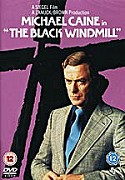
 Flix.com Flix.com
|
|
- For Barry McKenzie Holds His Own (1974, Bruce Beresford)
Donald Pleasence travelled once more to Australia to play a villain
spoofing his role in the James Bond-film You Only Live Twice.
The whole movie is actually a giant spoof of pretty much everything
dreamed up by popular Australian comedian Barry Humphries, who (among
other roles) also plays his most famous character Edna Average
in this one. Barry McKenzie by the way is played by Barry Crocker.
- The espionage/kidnapping thriller The Black Windmill (1974)
is one of legendary director Don Siegel's lesser films, the story of a
British agent (Michael Caine) turning rogue to free his son from
kidnappers. Donald Pleasence plays Caine's boss, who even turns
against him in the course of the proceedings.
- Altrimenti ci Arrabbiamo/Watch Out, We're Mad (1974,
Marcello Fondato) is actually a Bud Spencer/Terence Hill comedy, and
the film, in which they play stunt drivers, is pretty much tailored to
their demands. Still, Pleasence turns in a funny performance as
psychiatrist.
- La Loba y la Paloma/House of the Damned/The Wolf
and the Dove (1974, Gonzalo Suárez) is a rather obscure Spanish
thriller with Donald as the main villain, an escaped convict looking
for a treasure in an old mansion and terrorizing the family living
there.
| 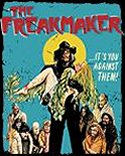
 Flix.com Flix.com
|
|
- In The Mutations/The Freakmaker (1974, Jack Cardiff), Donald
Pleasence can be seen as a mad scientist who tries to cross humans
with plants, assisted by Tom Baker [Tom Baker
bio - click here], and
heading a cast that also includes Brad Harris [Brad
Harris bio - click here], Julie Ege and Michael
Dunn. Now granted, the story doesn't sound like much, but the cast
leaves little to be desired ...
- I Don't Want to be Born/The
Monster (1975, Peter Sasdy) is a British
shocker starring Joan Collins, Ralph Bates and Caroline Munro [Caroline
Munro bio - click here] with more than a few parallels to It's
Alive (1974, Larry Cohen [Larry
Cohen bio - click here]), The
Exorcist (1973, William Friedkin) and Roman
Polanski's Rosemary's Baby (1968) - however, considering pure
quality, this film doesn't even come close ...
- The Count of Monte-Cristo (1975, David Greene) is a
British-Italian made-for-TV-adaptation of the popular novel by
Alexandre Dumas sr starring Richard Chamberlain in the lead,
Tony Curtis, Trevor Howard and Louis Jourdan - who played the lead in
the Italian 1961 adaptation Le Comte de Monte Cristo/The
Count of Monte Cristo (Claude Autant-Lara).
- Escape to Witch Mountain (1975, John Hough) is a Walt
Disney Production, meaning a family (read kiddie) feature about
two kids (Kim Richards, Ike Eisenmann) who have supernatural powers,
and are thus chased by a scheming millionaire (Ray Milland). Eddie
Albert is also in the cast.
- Journey into Fear (1975, Dniel Mann) is a thriller based on
the popular novel by Eric Ambler (which has previously been filmed in
1943 by Norman Foster starring Joseph Cotten, Orson Welles and Dolores
Del Rio, and in 1956 as an episode of the TV-series Climax
by Jack Smight). This one stars Sam Waterston, Zero Mostel, Yvette
Mimieux, Shelley Winters, Vincent Price and Jackie Cooper, popular
child-star of the 1930's.
- Hearts of the West (1975, Howard Zieff) is a light hearted
and pointless comedy that features Jeff Bridges as a farmboy who
becomes a silver screen cowboy rather by chance. Andy Griffith, Blythe
Danner and Alan Arkin are also in this one.
- In Trial by Combat (1976, Kevin Connor), Pleasence plays the
head of a group of British aristocrats who have decided to take
justice into their own hands - and start killing people. Fortunately
the film doesn't take itself too seriously. Peter Cushing and Barbara
Hershey are also in this one.
| 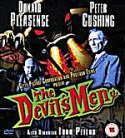
 Flix.com Flix.com
|
|
- Peter Cushing is also in the British-US American-Greek co-production
The Devil's Men (1976, Kostas Karagiannis), a cheap horror film
in which he plays the head of a Satanic cult while Donald Pleasence
plays his chief adversary, a priest (what else ?).
- The Passover Plot (1976, Michael Campus) is yet another
retelling of the Jesus-story. This time around, Donald
Pleasence is Pontius Pilate while Zalman King plays the son of God.
- The Last Tycoon (1976, Elia Kazan) is a high prestige
adaptation of the popular novel by F.Scott Fitzgerald with a
screenplay by none other than Harold Pinter. Robert de Niro plays the
lead in this film that also stars Tony Curtis, Robert Mitchum, Jeanne
Moreau, Jack Nicholson, Ray Milland, Dana Andrews, Peter Strauss,
Theresa Russell and John Carradine in a small role [John
Carradine bio - click here].
- In Hindle Wakes (1976), a TV-movie directed by Pleasence'
friend and idol Laurence Olivier and June Howson, Donald Pleasence is
the focus of attention and allowed to pull all the stops, which he does
with great gusto. The film itself is based on a play by Stanley
Houghton from 1912 about a girl who is impregnated after having
premarital sex and the social consequences this has on those close to
her ...
- In John Sturges' The Eagle has Landed (1976), Michael Caine
heads a paratroop commando to kidnap Winston Churchill during World
War II. Donald Pleasence can be seen as Heinrich Himmler, commander or
the SS in a film that also features Donald Sutherland, Robert Duvall
and Jenny Agutter.
- In 1977, Donald Pleasence can be seen in his 3rd Jesus
adaptation. This time he plays the role of Melchior of the Three
Wise Men in Franco Zeffirelli's all-star cheesy TV miniseries Jesus
of Nazareth with Robert Powell in the title role and Anne
Bancroft as Mary Magdalene. The film also features Ernest Borgnine,
James Earl Jones, Stacy Keach, Claudia Cardinale, Laurence Olivier,
James Mason, Christopher Plummer, Anthony Quinn, Fernando Rey, Michael
York, Ralph Richardson, Peter Ustinov, Olivia Hussey as Virgin Mary,
and Rod Steiger as Pontius Pilate, the role Donald Pleasence played
just a year ago.
| 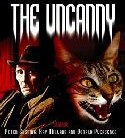
 Flix.com Flix.com
|
|
- With The Uncanny
(1977, Dénis Heroux) it was back to horror again for Pleasence. The
film essentially tells three stories about cats (!) wanting to
take over the world held together by a framing story starring Peter
Cushing and Ray Milland. In Pleasence' story he, a famous
moviestar, and his mistress Samantha Eggar dispose of his wife
live on the set of his latest film - which clears him of all
suspicion. Only his wife's cat knows the truth and has her revenge.
This of course sounds like good fun, but apart from solid performances
(especially Donald Pleasence turning in a poignant characterisation)
the film has little to go for it.
- Oh God! (1977, Carl Reiner), which stars John Denver as a
supermarket assistant who suddenly finds himself chosen to be God's
(George Burns) messenger on earth, is little more than a wholesome
(read cheesy) comedy that does not stand the test of time.
- Telefon (1977, Don Siegel) is a cold war thriller about KGB-drilled sleepers living undercover in the USA with the sole purpose to
one day commit acts of sabotage under hypnosis. Donald Pleasence plays
a KGB agent who has stolen the notebook containing the identities of
the sleepers and has defected to the USA - but not to hand the
notebook over to the authorities but to activate the sleepers. The
KGB, fearing an international crisis if the whole thing is uncovered,
send their best man Charles Bronson after Pleasence to stop him. A
somehow amusing film that does not rank among Siegel's best though.
Lee Remick co-stars.
-
For the TV-movie The Defection of Simas Kurdika (1978, David
Lowell Rich) - another Cold War thriller, incidently, but this one
based on a true story and starring Alan Arkin, - Donald Pleasence was
actually nominated for a Primetime Emmy as Best
Supporting Actor in a Comedy or Drama Special - but ultimately
lost out to Howard Da Silva in Verna: USO Girl (1978, Ronald
F.Maxwell), a drama/musical starring Sissy Spacek.
- The French-Canadian co-production Les Liens de Sang/Blood
Relatives (1978) is an old-fashioned yet highly intelligent murder
mystery directed by French star director Claude Chabrol, who for this
film had a quite stellar international cast at hands, including Donald
Sutherland as the investigating police inspector of the film, David
Hemmings and Stéphane Audran. Donald Pleasence has a small but
effective role as a child molester in this one.
- Sgt. Pepper's Lonely Hearts Club Band (1978, Michael
Schultz), a film based on the milestone album by the Beatles starring
Peter Frampton and the Bee Gees is probably best described with the
words What were they thinking ? I mean really, Peter
Frampton and the Bee Gees ? Others who star in this mess
are comedien Frankie Howerd, Steve Martin (who probably also qualifies
as a comedien), rockstar Alice Cooper, and the bands Earth, Wind &
Fire and Aerosmith.
- L'Ordre et la sécurité du Monde/The Concorde Affair/Last
in, First out (1978, Claude d'Anna) is a bizarre French politidal
thriller starring Bruno Cremer, Laure Dechasnel, Dennis Hopper, Joseph
Cotten, Michel Bouquet, Pierre Santini and Henri Serre.
- The rest of the films Donald Pleasence made in 1978 though saw him
stranded with B-horror, films like Tomorrow Never Comes (1978,
Peter Collinson), Night Creature (1978, Lee Madden) and Power
Play (1978, Martyn Burke).
... and on the surface, the next film that came along for Donald
Pleasence in 1978 was just another shocker with a moderate budget, yet it
was probably one of the most important films of his career and some kind
of turning point.
To the better ?
You be the judge of that, but the effects of this little 1978 shocker
are undeniable, and its name is Halloween
(1978, John Carpenter) ...
Halloween, the Sequels, and
John Carpenter
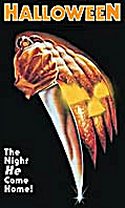
 Flix.com Flix.com
|
| |
It was 1978, and director John Carpenter, then a relative newcomer,
wanted to make a movie based on both Alfred Hitchcock's Psycho
(1960) and the giallos of Italian master director Dario Argento, but the
formula of all of these movies pretty much stripped to the bone:
Basically, John Carpenter's resulting film Halloween
was about pretty young girls being stalked and slashed by a masked maniac,
Michael Myers, first and
foremost Jamie Lee Curtis - though ultimately she is not slashed.
Of course, this plot sounds highly formulaic, and ultimately, Halloween
would wind up to be one of the first (but by no means the first) -
and certainly one of the best - movies of the slasher subgenre, a genre
that as such didn't even exist in 1978. Plus, as bare-to-the-bone as the
film may be, John Carpenter proves himself one of the best suspense
directors there are and handles the film's story, simple as it might be,
with enough style to set it apart from similar genre fare. In Halloween,
Donald Pleasence did get to play not the villain but the good guy for a
change, a character called Sam Loomis (named after the character in Psycho),
the expert and father figure of the whole film, a role Pleasence handled
with so much dignity that after this film he was asked to play similar
roles in tons of movies. Interestingly enough though, Pleasence was
allegedly only
the third choice for the role and was approached only after both Peter
Cushing and Christopher Lee turned it down ...
Halloween,
simple as it was in plot and structure, would turn out to be an enormous
box office success, maybe the biggest in Pleasence' career, so it was only
a matter of time before a sequel (or rather sequels) would follow:
- Halloween 2 (1981, Rick Rosenthal), which John Carpenter
co-produced with Debra Hill, picks up directly where Halloween
left off, with Jamie Lee Curtis' character being rushed to the
hospital, and Michael Myers, against all odds having survived his death in the former
movie, starting to slash teen girls again, and eventually making it to
the hospital where Curtis, who is rather unnecessarily revealed to be
his sister, is kept. Loomis in this film is to be driven out of the
picture at one point, but returns in time for the finale, even if he
has to turn against authorities to do his thing.
- There is no Sam Loomis (Pleasence) and no Michael Myers in Halloween
3: Season of the Witch (1982, Tommy Lee Wallace), an ill-adviced,
ill-fated and ultimately unsuccessful attempt to break away from the
tried-and-true formula, but both returned for Halloween 4: The
Return of Michael Myers (1988, Dwight H.Little), which was little
more than a rehash of the first film, with Jamie Lee Curtis gone, of
course.
- Same can be said about Halloween 5 (1989, Dominique
Othenin-Girard) and Halloween 6/Halloween: The Curse of
Michael Myers (1995, Joe Chapelle), both rather brainless slasher
movies from a time when slashers had already gone out of fashion, and
that apart from Donald Pleasence still giving his all despite not
being the youngest anymore (he was 75 when he shot part 6) had little
to offer.
Donald Pleasence died not long after the completion of Halloween 6,
and with him the series should have died ... but not so, in 1998 a birthday
movie was made called Halloween H20 (Steve Miner), which was
followed in 2002 by Halloween: Resurrection (Rick Rosenthal), both
films returning Jamie Lee Curtis to the series and both trying to cash in
on the new interest in slasher films initiated by Scream (1996, Wes
Craven) - with only moderate success though. And to add insult to injury,
Carpenter's original Halloween
was remade in 2007 for the popcorn crowd by the overrated Rob Zombie.
Well, at least Zombie had the good sense to have someone like Malcolm
McDowell fill Donald Pleasence' boots as Sam Loomis.
Let's go back to 1981, when John Carpenter was filming the science
fiction spectacle Escape from New York: This was the story of Snake
Plissken (Kurt Russell), a notorious loner and all-around tough guy, who
is forced to get the president of the USA out of New York, which by the
time the movie is set is totally overrun by evil gangs and where law is
pretty much suspended. Most of the film deals with Russell risking his
life in various situations and barely surviving his mission - which in
John Carpenter's back then decidedly and enjoyably twisted universe meant
that to contrast Russell's tough-as-nails antiautharian character, the
president as a figure of authority had to be an opportunistic coward full
of empty phrases ... and who better to play such a character than Donald
Pleasence, whose performance as Mr President is more than a little
reminiscent of his character in Cul-de-Sac
- before that character snapped, anyways ...
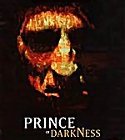
 Flix.com Flix.com
|
| |
| 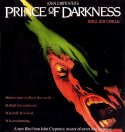
 Flix.com Flix.com
|
|
It is said that John Carpenter also wanted to hire Donald Pleasence for
his rather unnecessary remake The Thing (1982), but Pleasence had
to turn the offer down because of conflicting schedules, so it wasn't
until 1987 that the two worked together once more. Unfortunately, Prince
of Darkness, their third and last collaboration, is not one of
Carpenter's better films, the story about a group of university
researchers investigating a cylinder containing the son of Satan (in
liquid form !) and releasing hell on earth (literally) in the process seriously lacks
substance (despite being very well made), and Donald Pleasence, playing
another character called Loomis, this time a priest, is given little to do
than make a few comments here and there ...
B-Movie Realm: The Late
1970's, 80's, 90's As mentioned above, Halloween
was a box office success, and it gave Donald Pleasence' career, that had
gone a little rigid for a while, another boost - but it also nailed down
the role cliché that he had to play from now on until his death in 1995
(with only very few exceptions): That of the father figure and/or
authority figure in predominantly B-movies while with the years
progressing, roles in A- or prestige-movies got rarer and rarer, and when
he did get them, the roles weren't always too great or interesting in the
first place. Nevertheless, according to all interviews Pleasence gave
during that time, he always saw the whole situation from the funny side. Some
of Pleasence' A- and/or prestige productions from his later life were:
- Dracula (1979), a new version of Bram Stoker's novel directed
by (of all people) John Badham fresh from Saturday Night Fever
(1977), who gave the film some trendy visual flair (that on closer
inspection is highly artificial) but robbed it of all its substance. Dracula
is here played by Frank Langella, his nemesis Van
Helsing by Laurence Olivier, while Donald Plesence plays
Doctor Seward, the father of Lucy (Kate Nelligan), the woman so
pivotal to the plot. In an interview, Pleasence stated that he and
Olivier agreed to do that movie only to have a good laugh ... and
well, the nicest thing to say about the film is that isn't quite a
disaster as Francis Ford Coppola's version of the story from 1992 -
but that's quite another story ...
- All Quiet on the Western Front (1979, Delbert Mann) is a new
version of Erich Maria Remarque's novel of the same name already made
into a milestone movie in 1930 by Lewis Milestone. Why the story
needed a new adaptation, and for TV too, quite escapes me ...
- Good Luck, Miss Wyckoff (1979, Marvin J.Chomsky) is a rather
clumsy message movie set in the 1950's about a spinster in her 40's
(Anne Heywood) who is raped by a black student - but gets so aroused
by it that she actually starts an affair with him ... but what will
the neighbours think ? Robert Vaughn is also in this one.
- The little known British TV-drama Blade on the Feather (1980,
Richard Loncraine) is one of the rare exceptions at this stage of his
career that gave Pleasence the opportunity to show off his acting
skills in a story in which he plays an old writer visited by one of
his admirers (Tom Conti) - and rather unexpectedly the situation soon
turns into a story about espionage and treachery. The script for this
movie was written by famed and controversial writer Dennis Potter.
- Witness for the Prosecution (1982, Alan Gibson) is a
made-for-TV adaptation of the famous play by Agatha Christie, which
saw a far better big-screen adaptation in 1957 by Billy Wilder. Still,
at least this one features a good cast including Diana Rigg, Ralph
Richardson, Deborah Kerr and Beau Bridges.
- The comedy Where is Parsifal ? (1983, Henri Helman) is mainly
notable for being one of Orson Welles' last films as an actor. It also
stars Tony Curtis, Erik Estrada and Peter Lawford.
- The Ambassador (1984, J.Lee Thompson) is a political thriller
about
the Middle East peace efforts that tries a little too hard to be
intelligent to not be run-of-the-mill and far-fetched. It stars Robert
Mitchum, Ellen Burstyn, Rock Hudson (his last big-screen appearance),
Fabio Testi, Michal Bat-Adams, and Zachi Noy and Yftach Katzur from
the popular Israeli Lemon Popsicle series..
| 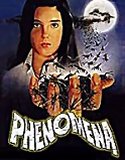
 Flix.com Flix.com
|
|
| 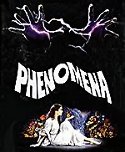
 Flix.com Flix.com
|
|
- Phenomena
(1985, Dario Argento) on the surface looks like little more than
another slasher movie with Pleasence playing another expert
(this time he's an entomologist) to another teenage girl (a young
Jennifer Connelly, who in this one is an insect lover), but director
Argento turns this one, which is essentially a slasher movie following
every rule of the book (though Argento might have written a few of
these rules himself in the first place), into a fairy tale-like
experience. Sure, it's still gory and simplistic as these films tend
to be, but somehow there is also another dimension to it, and at least
Pleasence and Connelly turn in good performances not usually found in
this sort of film.
- For Basements (1987), arthouse director Robert Altman adapted
two short plays by master playwright Harold Pinter - who was also
responsible for Donald Pleasence' breakthrough performance The Caretaker
- for television. In the story The Room, Pleasence shares the
screen with Linda Hunt, Annie Lennox and Julian Sands while the other
episode, The Dumb Waiter, features John Travolta and Tom Conti
(but no Donald Pleasence). In both cases, the results are quite
fascinating.
- Ten Little Indians (1989, Alan Birkinshaw) is yet another
adaptation of Agatha Christie's novel of the same name, probably her
best novel anyways. However, the resulting film does the novel little
justice, probably thanks to producer Harry Alan Towers, not a man of
subtlety an adaptation of the novel might need. Cast includes Frank
Stallone and Herbert Lom - who also had a role in an earlier
adaptation of the novel, Ein Unbekannter rechnet ab/And Then
They Were None/Ten Little Indians (1974, Peter Collinson),
which unfortunately was also produced by Harry Alan Towers.
- Speaking of Agatha Christie: In 1989, Donald Pleasence also had a
part in A Caribbean Mystery, an episode of BBC's
long-running Miss
Marple-TV-series starring Joan Hickson. But while the
series is often praised for being true to Christie's novels (sometimes
to the letter), Hickson's portrayal of the lead character simply pales
compared to Margaret Rutherford's amusing (if admittedly very free)
characterisation of the amateur sleuth (click
here).
- Again for television, this time French television, Pleasence played
Winston Churchill in Moi, Général de Gaulle (1990, Denys
Granier-Deferre) based on a story by William Faulkner, with Henri
Serre playing de Gaulle.
- In 1992, Pleasence was hired by Woody Allen to act in his Shadows
and Fog, the film's stellar cast also inclulding Allen himself of
course, Mia Farrow, John Malkovich, and in small roles Madonna, Lily
Tomlin, Jodie Foster, Kathy Bates and John Cusack. Now normally, a
role in a Woody Allen-movie would be the highlight of pretty much
anybody's acting career, but unfortunately, Shadows
and Fog, a
film partly based on Allen's own play Death and supposed to be
a hommage to vintage horror, would turn out to be one of Allen's less
accomplished (and today by and large forgotten) films, and Pleasence
might only have been in it because of his long association with the
horror genre.
- The Hour of the Pig (1993, Leslie Megahey) is a rather
off-beat medieval thriller that starts with an animal trial (such
things did really exist long long ago) and evolves into a murder
mystery. Colin Firth and Ian Holm star in this one as advocate and
educated priest actually. For some reason though, this film is by
today largely forgotten.
- The US-American TV-movie Guinevere (1994, Jud Taylor) is
little more than the umpteenth adaptation of the King
Arthur-legend, but this time from a feminist revisiionist
point of view based on the novels by Persia Woolley (for better or
worse), with Sheryl Lee playing the title character, Sean Patrick
Flanery is Arthur,
Noah Wyle Lancelot, Brid Brennan Morgana
Le Fay, and Donald Pleasence can be seen as Merlin.
As mentioned above, these were only the higher profile films of Donald
Pleasence done from the late 1970's onwards, besides these he leant his
talents to virtually dozens of films that were not as prestigious - even
if some of them were actually better movies or at least more amusing than
the above-mentioned. Also, his performances in films like those were
somewhat uneven. If he found an access to his role, he could still be
great, in other films he gave a solid but run-of-the-mill performance, and
occasionally he let loose and hammed it up royally - which is also a sight
to be seen ...
The more interesting of these films are:
- Gold of the Amazon Women (1979, Mark L. Lester) is one of
those truly awful (but in a way hilarious) jungle pictures they
(whoever they are) put out in the late 1970's/early 80's. Nothing to
be proud of actually, but still, this one stars Bo Svenson and Anita
Ekberg way past her prime.
-
The US/Spanish co-production Jaguar Lives!/El Felino
(1979, Ernest Pintoff), a showcase for hevyweight kickboxing champion
Joe Lewis, is a film pretty much as subtle (and as silly) as the title
in combination with its lead makes it to be. Still the film features a
rather stellar cast including Christopher Lee, Barbara Bach, Capucine,
Woody Strode and John Huston.
- The French Atlantic Affair (1979, Douglas Heyes) is actually
a horrible US American TV miniseries about a group of terrorists
led by Telly Savalas who takes over a luxury liner and hold its crew
and passengers hostages but is ultimately defeated by two ten year
old (count them, ten) amateur radio experts. If that sounds bad,
believe me, the series is much worse, still it (once again) features a
stellar cast, including Horst Buchholz, Shelley Winters, José Ferrer,
James Coco, Michelle Phillips and Louis Jourdan.
- The Monster Club (1980, Roy Ward Baker) is a not totally
convincing hommage to horror films of old, but it stars Vincent
Price [Vincent Price bio
- click here] and John Carradine [John
Carradine bio - click here], plus Anthony Steel, Richard Johnson, Britt Ekland, Stuart Whitman and Patrick Magee.
The film was famed horror production house Amicus'
last (first generation) feature by the way [Amicus
history - click here].
- Then there's L'Uomo Puma/Puma Man (1980, Alberto De
Martino), an underbudgeted superhero flick in which Pleasence plays
the villain to Walter George Alton's (who ?) titular hero ... oh well.
- The most interesting thing about Race for the Yankee Zephyr (1981)
is probably that it was directed by acting legend David Hemmings, but
that's about as good as it gets, the film as such, starring Ken
Wahl, Lesley Ann Warren and George Peppard, is a rather terrible and
badly scripted adventure movie set in the mountains of New Zealand.
- The US-American made-for-TV sci-fi movie Computercide (1982,
Robert Michael Lewis) deserves a mention only because of its stupid
title. Computercide? I mean really ...
- Just like in Halloween,
Donald Pleasence heads a lunatic asylum in Alone in the Dark
(1982, Jack Scholder), and just like in Halloween,
some loonies escape, but this time they lay siege on Pleasence' house.
As a whole the film is silly enough to be almost funny. Jack Palance
and Martin Landau are also in this one.
- Warrior of the Lost World/Il Giustiziere della Terra
Perduta/I Predatori dell'Anno Omega/Mad Rider (1983,
David Worth) is one of these cheap Italian lensed post doomsday
science fiction films that are somehow supposed to cash in on Mad
Max II/Road Warrior (1981, George Miller), but are rather
laugh-inducing in their effort. In this one, Robert Ginty of all
people plays the loner on a motorbike. Blaxploitation hero Fred
Williamson is also in this one - as he tended to be in quite a few of
these films.
- The Devonsville Terror (1983, Ulli Lommel) is a modern day
witchhunt tale, with Pleasence playing a historian caught up in the
events - but actually the film is more of a showcase for its lead
Suzanna Love, who also co-wrote the film, and who was not only
director Lommel's wife but also his chief financier thanks to her
fortune from the Dupont inheritance.
- In Frankenstein's Great Aunt Tillie (1984, Myron J.Gold),
Pleasence gets to play Baron
Frankenstein in a totally botched up horror comedy that is
about as funny as its title and that interestingly enough also stars
Yvonne Furneaux, Zsa Zsa Gabor, June Wilkinson and Aldo Ray.
- A Breed Apart (1984, Philippe Mora) is pretty much a
reworking of Sylvester Stallone's hit First Blood (1982, Ted
Kotcheff), but with an ecological message (what were they thinking ?).
Rutger Hauer plays the good guy, while Pleasence is the baddie, a
collector of rare bird eggs, and Powers Boothe his machine gun
carrying henchman. Kathleen Turner and Brion James are also in this
one.
- To Killl a Stranger/Matar a un Extraño (1985) is an
US/Mexican co-production directed by Mexican cult director Juan Lopéz
Moctezuma (Mansion
of Madness [1972], Alucarda [1978]). Unfortunately this
is not one of his better films, but fortunately it still is fun. Dean
Stockwell and Aldo Ray also star.
- The Treasure of the Amazon (1985, René Cardona jr) is one of
these Mexican trash films you always wonder how they got so much
internationally renowned actors to play in (this one also stars Stuart
Whitman and Bradford Dillman) - but dedicated trashfans like me are
just happy they are in it so it gets international distribution. This
one is about - you guessed it - a treasure hunt in the Amazon jungle,
featuring everything that can expected from an adventure like this
including headhutners, topless Amazon warriors, piranhas and
alligators, plus Pleasence gets to play a Nazi who wants to resurrect
the Third Reich.
- The Italian film Sotto il Vestito Niente/Nothing Underneath
(1985, Carlo Vanzina) is a giallo (specifically Italian murder
mystery with horror undertones and often a serial killer motive) from
a time when this genre has already run its course - and is therefore
not all that special.
- Into the Darkness (1986, David Kent Watson) is a rather
pointless thriller set on a remote island where a serialkiller is
doing his shtick, killing one model after the other and Donald
Pleasence and his real life daughter Polly Jo Pleasence try to figure
out who the killer is.
- Cobra Mission/Die Rückkehr der Wildgänse/Operation
Nam (1986, Fabrizio de Angelis) is one of the countless
(attempted) cash-ins on the success of Rambo: First Blood Part II
(1985, George P Cosmatos) starring Sylvester Stallone. As the Stallone
film, this is about veterans going back to the 'Nam to free some POWs.
But while good Sylvester went all by himself, in this film it's four
veterans (Oliver Tobias, Christopher Connelly, Manfred Lehmann, John
Steiner) who do the job. Donald Pleasence can be seen as a priest in
the jungle here - not that it really matters, the film is still rather
terrible. Gordon Mitchell, Alan Collins and action auteur Enzo
G.Castellari [Enzo
G.Castellari bio - click here] all do cameos in this one.
- Warrior Queen (1987, Chuck Vincent) is an Italian production
by schlock specialist Harry Alan Towers about the destruction of
anicent Pompeii by the eruption of Mount Vesuvius - but actually it's
more about contemporary B-movie sexpot Sybil Danning [Sybil
Danning bio - click here] fighting, looking
sexy or looking sexy fighting, and a few sexy slavegirls, resulting in
a film as cheapish, trashy and exploitative as you would imagine.
Donald Pleasence can be seen as the ruler of Pompeii.
- In the Italian shocker Spettri/Specters (1987,
Marcello Avallone), Pleasence plays another professor-character - and
there's little else that's worth saying about this film.
- Il Ritorno di
Django/Django
2: Il Grande Ritorno/Django
Strikes Again (1987, Nello Rossati) is a film nobody has
really needed, the long-awaited (as in not) sequel to the
spaghetti Western classic Django
(1966, Sergio Corbucci), starring once again Franco Nero [Franco
Nero bio - click here]. Actually, the less said about this
movie the better ...
- Then there was Doppio Bersaglio/Double Target (1987),
an action movie by Bruno Mattei (as Vincent Dawn) [Bruno
Mattei bio - click here] starring Miles
O'Keeffe - need I say much more ?
- The House of Usher (1988, Alan Birkinshaw) is one of those
Edgar Allan Poe-adaptations that all of a sudden became fashionable in
the late 1980's. This one is mainly watchable for Oliver Reed hamming
it up as Roderick Usher and Donald Pleasence playing his mad brother
Walter who frequently carries a chainsaw. The film was produced by Harry Alan Towers, which
should give you some idea about its quality.
- In Italy again, Pleasence played the inspector in Ruggero Deodato's
Un Delitto poco Comune/Phantom of Death (1988), a giallo
also starring Michael York and Edwige Fenech. Unfortunately though, Phantom
of Death is not among Deodato's better shockers [Ruggero
Deodato bio - click here].
| 
 Flix.com Flix.com
|
|
- The war film Der Commander/The
Commander (1988) is the third and last part of Antonio
Margheriti's Mercenary Trilogy [Antonio
Margheriti bio - click here]. The film, which also stars
Lewis Collins, Lee Van Cleef, Manfred Lehmann and Brett Halsey, might
be nothing great but at least it's solid action.
- For Pleasence, it was back to the war for Angel Hill: L'Ultima
Missione/Last Platoon (1988, Ignazio Dolce), an Italian film
lensed in the Philippines (just like The
Commander actually) standing in for Vietnam. Richard Hatch
plays the no-nonsense hero in this one.
- Then there was the vampire flick Nosferatu a Venezia/Nosferatu
in Venice (1988, Augusto Caminito) starring Klaus Kinski as the
titular vampire, Christopher Plummer as his Van
Helsing-like nemesis and Donald Pleasence as a priest,
while Barbara De Rossi is simply there to look ravishing (which she
manages to do admirably). Actually the film isn't half bad and good use is
made of the Venice-settings, but at the same time it offers little new
insight into the vampire genre as such and the solid cast seems a bit wasted in a formula-movie.
- The World War II/women's prison movie Hanna's War (1988) is
probably the best film infamous producer/director Menahem Golan ever
made (not that that's saying much), a film based on a true story about a
Hungarian resistance fighter (Maruschka Detmers) captured by the Nazis,
thrown into prison and tortured, with Donald Pleasence playing one of
her torturers. Ellen Burstyn and David Warner are also in this one.
| 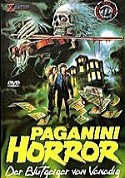
 Flix.com Flix.com
|
|
- Another film set in World War II from that time was Sergio Martino's rather weak Casablanca
Express (1989), in which Donald Pleasence plays a general who's
actually of no real importance to the proceedings.
- For Paganini Horror (1989, Luigi Cozzi), Donald Pleasence
returns to the horror genre, but unfortunately by the late 1980's, the
Italian horror genre was lieing in its death throes, and Italian
shockers like this one were mostly grossly underbudgeted and featured
horrible special effects. Add to that the once great director Luigi
Cozzi who has apparently grown tired of filmmaking and you pretty much
know what you get. Daria Niccolodi is also in Paganini Horror.
- River of Death (1989, Steve Carver) is a jungle action film
based on a novel by Alistair McLean starring Michael Dudikoff leading an
expedition into the Amazon jungle in search for a lost city ... only to
find a mad Nazi scientist (Robert Vaughn) instead. Herbert Lom is also
in this one, which was once again (co-)produced by Harry Alan Towers.
| 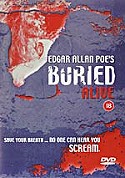
 Flix.com Flix.com
|
|
- Harry Alan Towers also produced Buried
Alive (1990, Gerard Kikoine) - a film only allegedly based on
something by Edgar Allan Poe -, and again Robert Vaughn plays the main
villain. The film, a standard slasher about girls disappearing at a
boarding school, is of interest mainly because it was the last film to
feature horror veteran John Carradine [John
Carradine bio - click here] - and he would have deserved a
better swansong. Former (and future) porn star Ginger
Lynn Allen is also in this one.
- American Risciò/American Rickshaw (1990) is an Italian
murder mystery set in Miami directed by Sergio Martino, who back in the
early-to-mid 1970's made quite a few impressive murder mysteries (or
gialli, if you may) ... but since the early-to-mid 1970's a lot of water
has gone down the drain, and this one turns out to be little more than
an underbudgeted, very average crime/action thriller with a
distinctly impersonal feel to it.
- Miliardi/Billions (1991, Carlo Vanzina) is basically a
sex drama with Billy Zane sleeping with as many women as possible,
there's not much more to it. Lauren Hutton, Carol Alt and Jean Sorel
co-star.
- Diên Biên Phu (1992, Peter Schoendoerffer) is - especially
when compared to most other war movies Pleasence did during that period
of his career - a quite engaging film about the war the French fought in
Vietnam in the mid 1950's based on true events, with Donald Pleasence in
the lead playing a war correspondent.
- The Big Freeze/Umpijäässä (1993, Eric Sykes) is a
British-Finnish comedy featurette (ca 45 minutes) about two plumbers
(Eric Sykes, Bob Hoskins) trying to fix the heating in a retirement home
on the coldest day of the year. The film, which is played entirely
without dialogue, also stars, besides quite a handful of Finnish talent,
John Mills and Spike Milligan as an over-the-top Hitler impersonator.
Fade Out
As you can see above, in the latter days of his career, Donald
Pleasence hardly got any roles really worthy of his talents, still, to
honour his achievements he was OBE in 1993, and deservedly so. Unfortunately the last two films of his career, both released after his
death, would not do him any justice either.
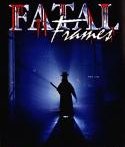
 Flix.com Flix.com
|
| |
First there was
above-mentioned Halloween 6/Halloween: The Curse of
Michael Myers (1995, Joe Chapelle), which was little more than a
formulaic series movie with Pleasence in the role he could already play in
his sleep. Pleasence' very last film was the Italian giallo Fatal
Frames (1996, Al Festa), a film that tries to be way too hard to
be clever for its own good (without achieving much) and that ends up to be
little more than an unconvincing collection of genre mainstays that tries
hard to look like a Dario Argento-movie without having the soul of an
Argento-flick. In the film, which also stars veterans David Warbeck, Linnea Quigley,
Rossano Brazzi, Alida Valli and Angus Scrimm, Donald Pleasence is reduced
to playing another professor-type character, just like Sam Loomis from the Halloween-series.
Pleasence died before the film was finished, which means he leaves the
film all of a sudden, and all we see as his exit scene is a stand-in phoning
in from
the airport bidding farewell because he has to go back to the USA to take care of the
Michael Myers case (yes, an obvious hint at the
Halloween-series),
with a photo of Donald Pleasence being superimposed over the scene ... now
that's what I call a weird exit ! Sadly, Donald Pleasence died
in early 2005 in Saint-Paul-de-Vence, Alpes-Maritimes, France from
complications from heart valve replacement surgery. During his lifetime,
he was married four times (and still, each of his marriages lasted more
than 10 years except for his last since he died before he could reach the
10-year mark) and he had five children, all of them girls, three of
which, Angela, Polly Jo and Miranda also became actresses (with only
Angela Pleasence having really come into her own). Allegedly, shortly
before his death, Donald Pleasence planned a production of Shakespeare's King
Lear with all three of his actress-daughters ... Besides
his daughters, Pleasence also left behind an incredibly wealthy
filmography as you no doubt can see above, and even though way too many of
his films did by no means match his talents and (on a quality level) his
career peaked with Cul-de-Sac,
done roughly 30 years before his death, he was until his death one of the
character actors who could give an otherwise forgettable film some colour
by his sole presence - which is something genre- and trashfilm fans like
me will be forever grateful for ...
|